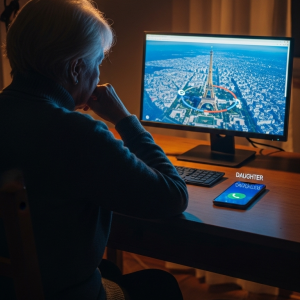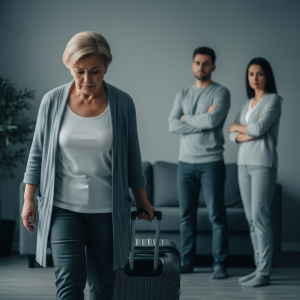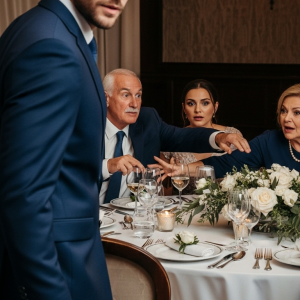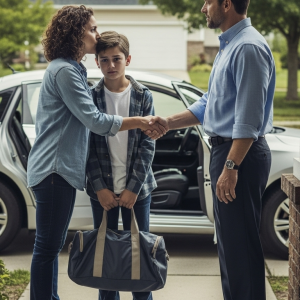At my birthday brunch, my grandpa smiled, the fine lines around his eyes crinkling with genuine warmth. He raised his mimosa, the crystal flute catching the morning light. “I’m so glad you’re enjoying the apartment I bought you, my girl,” he beamed across the table, his voice carrying over the gentle clinking of silverware on porcelain. “It’s just the start you deserve.”
His words hung in the air, a beautiful, perfect lie.
It was meant to be just another warm family moment, a celebration under the soft glow of the restaurant’s chandeliers. But for me, the air stilled. The orange juice in my own glass suddenly tasted acidic, burning a slow trail down my throat. My mother’s perfectly painted smile froze. My sister, Kayla, finally looked up from her phone, her brow furrowed in confusion.
And my father… my father’s hand went slack. His fork, laden with a piece of eggs benedict, clattered against his plate with a sharp, piercing clink that seemed to silence the entire room. I could feel my own heartbeat, a frantic drum against my ribs, as a dense, heavy quiet descended upon our table.
I carefully placed my napkin on my lap, my hands trembling slightly. I smoothed it out, once, twice. Then, I looked up and met my grandfather’s kind, expectant eyes.
“I live in a basement, Grandpa,” I whispered, the words barely audible, yet they landed with the force of a physical blow.
His smile faltered. “What was that, darling? I didn’t quite hear you.”
This time, my voice was louder, steadier, cutting through the stunned silence. “There is no apartment. I never got an apartment.” I wasn’t going to cry. Not here. Not after all these years of swallowing my pride and my pain.
A collective, unspoken gasp rippled around the table. The air, once filled with cheerful brunch chatter, now crackled with a tension so thick it felt like a storm cloud had gathered directly above us.
“What are you talking about?” Grandpa asked, his gaze flickering from me to my father, a slow, dawning horror creeping into his expression. Before I could answer, before the web of deceit could fully unravel, my mother’s voice, tight and strained, cut in.
“Daniel,” she said, turning slowly to my father, whose face had gone a pale, ashen grey. “You told us you helped her find a lovely little place downtown.”
My dad shifted uncomfortably, avoiding everyone’s eyes. “She… she was meant to…” he stammered, his usual confidence evaporating into thin air.
“No,” I interrupted, my voice sharp as broken glass. “You meant to keep it.”
“Hold on,” Grandpa said, his voice low and dangerous as he pushed his chair back a few inches. He pinned my father with a gaze as hard as steel. “I wired the down payment to your account four years ago. You told me you surprised Kayla with it after her graduation. You said… you said she was ungrateful, that she moved into her dream place without so much as a thank you.”
A bitter laugh escaped my lips. “There was nothing to thank him for.”
My father coughed, reaching for his water glass as if the truth were something caught in his throat. He looked at me, a desperate, cornered animal in his eyes.
I stood up, my own hands now shaking with a quiet rage that had been simmering for years. “You told me to stop expecting handouts. You let me scrub other people’s floors while you pocketed the money that was meant to give me a start. Did you enjoy that, Dad? Did it make you feel powerful, watching me struggle?”
The unspoken truths hung hot and venomous in the air. My sister had stopped chewing, her mouth agape. My mother looked as if she’d been slapped.
“I am done celebrating,” I announced, my heart pounding. I turned and walked away from the table, from the half-eaten food, from the family that felt like a collection of strangers. Behind me, chairs screeched against the floor. Footsteps followed, fast and urgent.
“Kayla, wait!”
It was Grandpa. I turned in the parking lot to face him. The years seemed to have settled on his shoulders in the last twenty minutes. The joyous grandfather from the brunch was gone, replaced by a man whose face was etched with a profound, unfiltered sorrow.
“You really never got the apartment?” he asked, his voice raw.
I shook my head. “I’ve been renting a windowless basement from a woman whose cigarette smoke has stained the walls yellow. There’s a boiler next to my bed that clanks all night. My rent is paid in cash because she doesn’t believe in banks. I’ve eaten dinner sitting on the floor more nights than I can count.” The words poured out of me, a flood of humiliation and hardship I had kept locked away.
He swallowed hard. “Your father said you didn’t want help. That you were being independent.”
“I asked him for a job lead once,” I replied, the memory still stinging. “He told me to try flipping burgers first, that it ‘builds character.'”
Grandpa’s eyes flickered with a cold fire. “This isn’t just a family drama, Kayla,” he said, his voice hardening. “This is theft. And I am done letting him lie to us.” He placed a steadying hand on my shoulder. “I want to see it. I want to see where you live.
My hed snapped up. “Why?”
“Because if it’s as bad as you say,” he said, his jaw tight, “then he didn’t just steal from you. He stole from both of us.”
That night, I led my grandfather down the crumbling side steps to my basement door. The single overhead bulb flickered as I unlocked it, revealing the cramped, dismal space I called home. The stale smell of old smoke and mildew greeted us like an unwelcome hug.
“Welcome to my palace,” I said with a humorless smile.
He stepped inside, his tall frame making the low ceiling feel even more oppressive. He took it all in: the secondhand couch with its lumpy cushions, the leaning bookcase, the water-stained ceiling tiles, the tiny bed pushed up against the groaning laundry machine. He didn’t speak for several long moments. Then, he sat on the edge of my bed and let out the saddest, most defeated exhale I had ever heard.
“This is what you’ve been living in?” he asked quietly.
I nodded, the shame I’d carried for so long finally giving way to a shared grief. “Since college.”
His eyes grew glassy. “He said he was saving the rest for your wedding… It made sense at the time.”
“There is no ‘rest’,” I said, my voice flat. “You gave him seventy thousand dollars. That money vanished the moment it hit his account.”
Grandpa looked from the peeling paint on the walls to my face, and a new resolve settled in his eyes. “Not anymore,” he declared. “Tomorrow, we’re going to the bank. And then to the lawyer. And after that, I think your father and I need to have a very, very long conversation.”
The next morning, I woke to the smell of burnt coffee and the sound of Grandpa on the phone with his lawyer, his voice like cold steel. “I don’t care if it’s Sunday, Howard. Find the paperwork. I want every transfer traced, every cent accounted for. And I want you to draft a letter stating that I no longer authorize Daniel Whitmore to act on my behalf in any financial capacity.”
By noon, we were sitting in a crisp, wood-paneled office downtown. A prim banker in her fifties clicked through records on her screen. “I do see the transfer here,” she said finally, adjusting her glasses. “From Mr. Whitmore’s account to Daniel Whitmore. The note says ‘Gift for Kayla’s Condo.'” She turned the monitor, and there it was in black and white: the date, the exact amount.
Then, she clicked again.
My heart dropped. A second transaction, dated five days later, showed my father moving the entire amount into a separate investment account under his name. No mention of me. No note. Nothing.
“Can I get a printed copy of all of that?” Grandpa asked, his voice dangerously calm.
When we arrived at my parents’ house, my father opened the door, his face a mask of annoyance that crumbled when he saw us. “We need to talk,” Grandpa said, his tone leaving no room for argument.
In the living room, the tension was a living thing. My mother hovered, my sister peeked from the stairs. Grandpa placed the thick folder of bank statements on the coffee table. He didn’t raise his voice, but every word was a hammer blow. He laid out the lies, the theft, the years of deception.
My father tried to defend himself, stammering about investments and my “future,” but the words were hollow.
“She’s been living in a basement!” Grandpa’s voice finally cracked with fury. “Eating on the floor, working two jobs, while you used her money to pad your portfolio!”
He slid the papers across the table. “You will repay every cent. You will explain yourself to this family. There will be no more secrets, no more pretending you are some noble father.”
Then he produced the lawyer’s letter. “And you will read this apology. Out loud. Now.”
My father’s hands shook as he began to read, his voice breaking. “I… I stole from my daughter, Kayla Whitmore… I took funds meant for her future and lied about their purpose… I have wronged her, my father, and the integrity of this family…”
As he finished, silence fell. Not the tense, shocked silence of the brunch, but a heavy, final silence. In that moment, looking at the broken man who was my father, I didn’t feel victorious. I felt… free.
The following Sunday, brunch was at my new apartment. It had floor-to-ceiling windows, and the first morning I woke up there, the sun streamed in as if it had been waiting for me. There was no clanking boiler, no smell of smoke, just the quiet peace of a new beginning.
Grandpa brought flowers. My cousin, who used to roll her eyes at my “art hobby,” asked me about color palettes and mood boards for her own place. My father wasn’t there. He had repaid the money, but his apology remained on paper. His absence was the greatest peace of all.
As I passed around a tray of fresh scones, I caught Grandpa watching me, a soft, proud smile on his face. “This,” he said, his voice thick with emotion. “This is what I always imagined for you.”
I touched his hand, my own smile finally genuine. “Me too, Grandpa,” I said. “Me too.” I had a home, a future, and a family that was smaller, but truer. I had finally found my light.
The following weeks were a blur of phone calls, paperwork, and whispered conversations that bled into arguments. My mother tried to smooth things over with practiced smiles, but her words rang hollow in every syllable.
“Your father didn’t mean—” she began one evening, when Grandpa and I stopped by to collect the first repayment check.
“He meant every single thing,” Grandpa cut her off, his voice sharp enough to slice glass. “He signed his name on stolen funds and let his daughter rot in a basement. Don’t you dare stand there and call it a mistake.”
Her mouth snapped shut. She’d never seen him this way before, and neither had I.
Kayla-from-the-basement would have shrunk in that moment. But the Kayla sitting beside him? I lifted my chin, staring right at her. “You knew, Mom. Maybe not all of it, but enough. You watched me struggle, and you chose to believe his story.”
For once, she didn’t argue. She just sat down, her eyes glassy, her hands folded in her lap like a child waiting for punishment.
Word spread in the family faster than wildfire. My cousins called. Aunts texted. My phone buzzed with “Is it true?” and “I can’t believe Uncle Daniel would do that.”
Grandpa didn’t hide it. At Sunday dinner the following week, he laid out the paperwork in front of everyone.
“This is what my son did,” he said simply. “I will not lie to protect him.”
The gasps, the whispers, the shocked stares—it was like the brunch all over again, but magnified. My father wasn’t just a disappointment to me anymore; he was exposed to the entire family as a thief.
Some relatives sided with him, of course. “Money is complicated,” one uncle muttered. “Maybe it was an investment that went bad.”
But Grandpa shut that down with a look. “Do investments usually involve forcing your daughter into a basement while you brag about her condo at brunch?”
Silence.
Kayla’s sister—my sister—was the hardest part. She called me late one night, her voice sharp with accusation.
“Why are you making this public? You’re humiliating us.”
I laughed bitterly. “Us? Or Dad?”
“You don’t understand,” she snapped. “He’s been under so much pressure. The business, the mortgage—he was trying to protect the family.”
“The family?” My voice rose despite myself. “Tell me, Kayla, when I was sleeping next to a clanking boiler and eating ramen every night, was that protecting the family?”
There was a pause on the line. For once, she had no comeback. Then she muttered, “You’ve always wanted to be the victim,” and hung up.
The words stung, but less than they would have before. Because now I had proof. And allies.
Grandpa wasn’t done.
One Friday, he invited my father to meet him at his lawyer’s office. I sat beside him, heart pounding as Dad walked in, looking ten years older, his once-pristine suit wrinkled.
The lawyer cleared his throat. “Mr. Whitmore, given the documented misappropriation of funds, you have two options: face legal charges or sign this repayment agreement under penalty of court enforcement.”
Dad’s jaw tightened. “You’d really do this to your own son?” he asked Grandpa, his voice cracking.
Grandpa leaned forward, his voice low and cold. “You stopped being my son the day you stole from her. Now you’re just another man who owes me money.”
I swear, I saw something break in him then. His shoulders sagged, his eyes darted, and for a fleeting moment, I almost pitied him. But then I remembered every night I’d worked double shifts, every tear I’d swallowed in silence.
I didn’t pity him. Not anymore.
Moving into my new apartment felt surreal. The first night, I lay in bed listening not to the groan of pipes but to silence. Real, blessed silence. The city lights glittered outside my window.
Grandpa brought groceries. He insisted on stocking my fridge himself. “No granddaughter of mine should live on ramen again,” he said, unloading milk, bread, fruit, and a box of pastries.
I laughed, real laughter this time. “You’re spoiling me.”
“No,” he said softly, placing a carton of eggs in the fridge. “I’m making up for lost time.”
Meanwhile, Dad unraveled.
Kayla told me he’d stopped showing up at work. The business floundered without his constant micromanaging. He started drinking more. Mom pretended everything was fine, posting old family photos on Facebook as if nostalgia could erase the truth.
One evening, he showed up at my building, drunk. He shouted from the sidewalk until security escorted him away.
“Kayla!” he slurred, his voice echoing off the glass. “You’re tearing us apart!”
I stood at the window, watching him stumble into the night. And for the first time, I didn’t feel fear. Just a strange, hollow sadness that this was the man I’d once looked up to.
Weeks later, Mom finally came alone. No Dad, no excuses. Just her, standing awkwardly at my doorway with a bouquet of cheap grocery-store flowers.
“I didn’t know it was this bad,” she said, her voice trembling.
“Yes, you did,” I replied, not cruelly, just firmly. “You chose not to see it.”
Her eyes filled with tears. “I was scared, Kayla. Scared of losing him. Scared of losing everything.”
“You already lost me,” I said quietly.
She winced, but didn’t argue. She placed the flowers on my counter and left. For the first time, I felt the weight of her absence not as a wound, but as a release.
Grandpa didn’t stop at repayment. He dug deeper. With the help of his lawyer, he uncovered tax discrepancies, shady side accounts, even a falsified loan document.
“Your father built his empire on sand,” Grandpa told me grimly. “And now the tide’s coming in.”
Within months, Dad’s business collapsed. Partners withdrew. Creditors circled. The house went up for sale.
Kayla, my sister, moved out, furious at everyone. Mom tried to patch things together, but there was nothing left to patch.
And through it all, Grandpa stood by me, steady as stone.
One night, months later, Dad asked to meet. Against my better judgment, I agreed. We sat in a dingy diner, the kind with cracked vinyl booths and weak coffee.
He looked gaunt, his hands trembling around the mug. “I never meant for it to go this far,” he said. “I thought I could make it back, surprise you later. I thought I was smarter than I was.”
I studied him. For once, there was no anger in me, only clarity. “You didn’t just steal money, Dad. You stole years. You stole the chance for me to start my life without scraping by. You watched me suffer and let me believe it was my fault.”
He bowed his head. “I’m sorry.”
The words were too small, too late. But strangely, I didn’t need more. I stood, placing a twenty on the table. “I hope you mean that,” I said. “Because I don’t hate you anymore. I just don’t need you anymore.”
And then I walked out, the cold night air filling my lungs like freedom.
Six months later, my apartment walls were filled with canvases of my own paintings. Bright, defiant colors. Grandpa visited every Sunday, bringing pastries and stories.
My sister still kept her distance, but sometimes she texted. Small steps.
My father? I didn’t know where he was. Maybe still in that diner, nursing cold coffee and regret. Maybe in some cheap apartment, learning what it felt like to lose everything.
All I knew was this: I was no longer the girl in the basement. I was Kayla Whitmore, artist, survivor, granddaughter of the fiercest man I’d ever known.
And for the first time in years, when I looked in the mirror, I didn’t see shame. I saw someone free.




